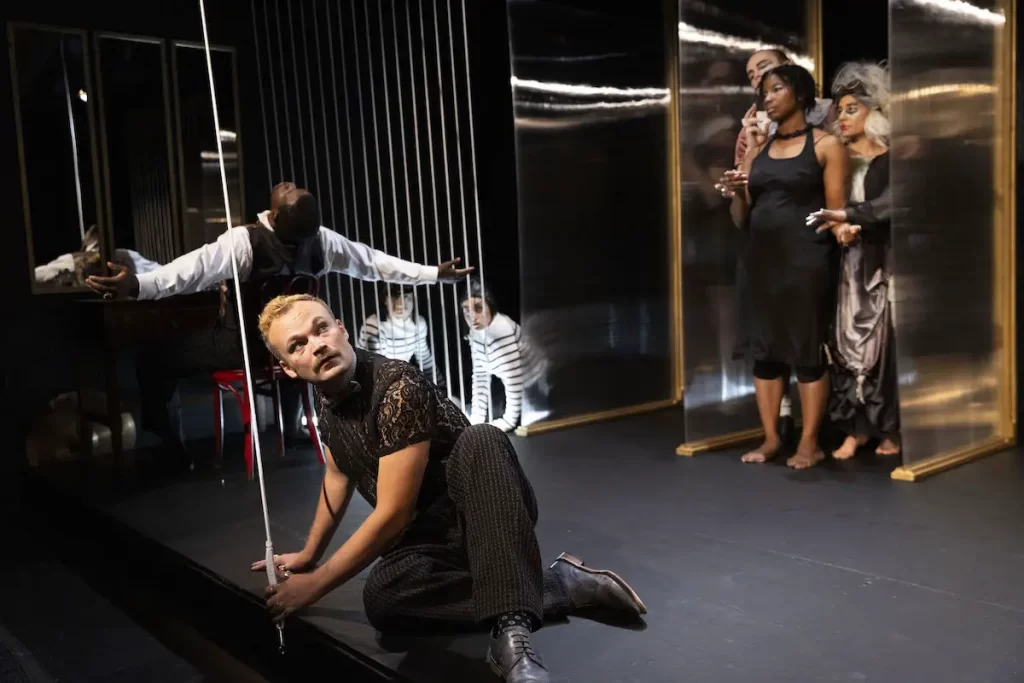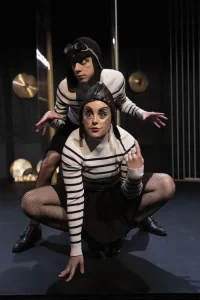
 *** If you like “Theater of the Absurd”, then this show is for you! “The Pragmatists”, directed by Zeljko Djukic and written by Stanislaw I. Witkiewicz in 1919, is a hodgepodge of profundity and bafflement. A dark comedy mix of burlesque, tomfoolery, existentialism, and fantasy with a touch of cabaret, this highly existential show can be funny, but its roots are sad and depressing. The characters are clownlike and dissimilar. They goof around one moment, argue and fight the next, sometimes “pretend” to having sex, and act on their impulses. Each character wants to capture life’s essence, whatever that may be—but in a very different way. As they each put forth their own unique take on life, Von Telek (Keith Surney) observes them all and interacts with them. What we discover is that the characters are basically different personalities (or aspects of his personality) that are projections within his mind.
*** If you like “Theater of the Absurd”, then this show is for you! “The Pragmatists”, directed by Zeljko Djukic and written by Stanislaw I. Witkiewicz in 1919, is a hodgepodge of profundity and bafflement. A dark comedy mix of burlesque, tomfoolery, existentialism, and fantasy with a touch of cabaret, this highly existential show can be funny, but its roots are sad and depressing. The characters are clownlike and dissimilar. They goof around one moment, argue and fight the next, sometimes “pretend” to having sex, and act on their impulses. Each character wants to capture life’s essence, whatever that may be—but in a very different way. As they each put forth their own unique take on life, Von Telek (Keith Surney) observes them all and interacts with them. What we discover is that the characters are basically different personalities (or aspects of his personality) that are projections within his mind.
Von Telek’s flirtations with death and doing personal harm to himself arise from a need to understand why life exists, specifically why his own life exists. Why are we here on earth in the first place? And what does it mean to live and be alive? His brain tries to experience the world and make sense of things through a process of segmentation, such that he compartmentalizes aspects of his personality into various components. These are comprised of: his mute wife Mamalia (Venice Averyheart), his asexual/transsexual colorful maid Rebis (David Lovejoy), his evil side the Mummy, a/k/a Princess Mandrake (Manuela Rentea), and his sometime friend and brother-in-law Plasfodor), a/k/a Francis in Polish and Franz in German (Kevin Webb). Whereas the Mummy is hidden just below the surface and can never be a member of polite society, Plasfodor is the most slippery character of all and does whatever is expedient. Generally repressed, each of these aspects take their turns within his consciousness and constantly shift in dominance.
The scenic design by Natasha Djukic, is brilliantly executed, especially the series of tall and open rectangular three-sided boxes, like doll compartments. The characters often leave their boxes towards the back of the stage to go to the front of the stage to struggle with each other for priority or they rotate in accordance with Von Telek’s priorities at any given moment. On both wings of the stage are two gendarmes (Caleb Lee Jenkins and Hannah Silverman), who monitor Von Telek’s mood and who bridge the life of his mind and the actions that he needs to take in the real world. Depicted as marionettes, the gendarmes wear bicycle goggles and skin-tight helmets and are dressed like prisoners. These are puppets on strings who could be thought of as akin to Freud’s superego, providing guidance on how their master ought to think about and deal with the reality outside of himself. As the gendarmes govern Von Telek’s disorganized thinking, they inform him of which portions of his personality ought to predominate at different moments of his life and how he ought to act within the society he lives in.
But as external forces (within Witkiewicz’s biography) change with World War I, Von Telek’s struggle with his existential situation shifts accordingly. Hence, this play could be thought to be a surrealistic and improbable analogy of how the mind might perceive of itself in response to external forces: terrible ones at that. When German invaders set out against Von Telek and others like him, Witkiewicz shows us how a highly questioning individual, who is uncertain of his place in life, can shift his perception to conform to the new authorities by taking on a new identity. Von Telek’s focus on existentialism might actually make it easier for him to adopt a new persona. He can identify with the oppressor and with evil—or at the very least, with the philosophy of a new regime—because it was always a (small) component part of his personality to begin with.
Since the play contains so many absurdities and loose threads, audience members might be perplexed by the story and especially by the ending—which (spoiler alert) I will reveal to the reader, namely, that one segment of Von Telek’s personality (known as Plasfodor) exchanges places with him. Specifically, we see the subsegment of Francis take his own poison in order to become Franz and replace Von Telek. To put this another way, what happens is when given the mandate to conform to a new social and political order, Von Telek goes inside the mirror located above his desk and, in the form of Franz, reimagines himself as a German sympathizer. The new external situation makes the gendarmes (with their puppet strings) deem it expedient to bring forward this (cutthroat) part of Von Telek’s mindset. Franz has always existed in a world inside the mirror, and so the gendarmes allow Von Telek to transcend the real and the imagined—and permit this part of his personality to predominate. What this ultimately means is that (at some level), he cannot be held morally responsible for doing what is pragmatic in the name of survival. Therefore, the “deviant” (or nonconforming) aspects of Von Telek’s mind must be killed off (as with Rebis) or become further repressed (as with Mamalia), while the Mummy (Princess Mandrake) must survive as Von Telek’s dark side (but not in a noticeable way). We witness that when Franz becomes the dominant personality, Von Telek puts on the sheer leopard shrug that the mute Mamalia previously wore over her black spandex outfit. This is a material sign that the once questioning element of Von Telek’s personality has retreated from public view to become buried into his subconscious.
Costume design, also carried out by Natasha Djukic, is exceptional and nicely captures the spirit of each of the characters. I loved the original music compositions by Natasha Bogojevic, who created poignant melodies for the glockenspiel. Sound designer Danny Rockett and lighting designer Richard Norwood have each done a great job with this show! The script was translated from Polish into English by Daniel Gerould and adapted by Adam Ranđelović.
Perhaps what Witkiewicz is trying to say is that conforming to hard, cold reality, bound by outrageous demands on one’s work and personal life, can deflect from critical reflections on the world and its meaning—and can potentially turn people into unthinking, possibly evil, reflections of themselves. Ceding personal responsibility, especially in an unjust society, may become a threat to individual freedom. I would argue that this show can apply to the present-day in that it serves as a warning as to what can happen when critical thinking is frowned upon and when it becomes pragmatic to be bound by the moral certitude of others.
“The Pragmatists” runs through October 28, 2023, at the Trap Door Theatre, 1655 W. Cortland Street, in Chicago.
Tickets: $30 with 2-for-1 admission on Thursdays.
Performance schedule:
Thursdays, Fridays, and Saturdays at 8:00 pm.
For more information and to purchase tickets, go to https://trapdoor.ticketleap.com/the-pragmatists/ or call 773-384-0494.
Special group rates are available. For information, call 773-384-0494 or email
To see what others are saying, visit www.theatreinchicago.com, go to Review Round-Up and click “The Pragmatists”.






More Stories
“Legally Blonde: The Musical”
Teatro ZinZanni Chicago “Love Chaos and Dinner”.
“A Bright Room Called Day”